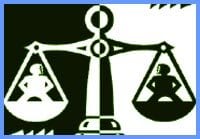Had a run-in with the police? Thinking of lodging a complaint? Watch out, you could get sued for defamation.
The African Canadian Legal Clinic is putting together a legal manual, warning its clients of the risks of criticizing the police.
“The purpose of the manual is to advise people generally in filing police complaints,” says the clinic’s Michelle Williams. “To let you know what you risk, and what might happen.”
Right now, the clinic is representing Ralph Kirkland, an Ottawa man charged with defamation by the police in 1995.
Here’s the story according to Kirkland, a prominent black activist in Ottawa.
Kirkland had parked his car and set out for a walk. Ottawa police were sitting in the parking lot, running his license plate through their computer.
A glitch in the system resulted in Kirkland’s plate failing to show up. The police followed Kirkland into the park, told him his plate was “unattached,” and asked for identification. Not understanding and knowing his rights, Kirkland refused and walked away.
Police kept pressing for identification. “At some point they said. ‘Forget it,'” says JR Richards, the clinic lawyer representing Kirkland, “so they knocked him to the ground, put his face in the snow, put his hands behind his back, cuffed him and arrested him.”
Kirkland was taken to the police station – and found to be the rightful owner of his car.
Kirkland took his case to the media. Twelve days later, he was charged – first with refusing to show ID (and fined $90), then later sued for defamation for alleging that what happened to him, happened because he is black.
“None of his allegations have any basis whatsover,” a police spokesperson said at the time.
A request by Kirkland to file private assault charges was turned down. Peter Griffiths, Eastern Ontario’s chief Crown attorney, said at the time there was “no reasonable prospect” of convicting the officers.
“What’s clear is that it’s a silencing tactic,” says Richards. “It’s being used to silence anyone who speaks out on police practices, who dares to express an opinion on police practices.”
Two Halifax lawyers, Anne Derrick and Rocky Jones, are facing a similar suit after representing three black 12-year-old girls in a 1995 case. Accused of stealing $10, the girls allege they were told to take down their pants and underwear, and lift up their shirts by the officer questioning them. The girls also said they were not read their rights or told they were legally allowed to have a lawyer present.
“We strongly felt our clients would not have been treated the same if they were white, and if their school had been in an area dominated by a different economic class,” says Jones. Shortly after a press conference along those same lines, Jones and Derrick were sued by the police for defamation.
Richards says in legal circles, such retributive actions on the part of the police are known as “flap actions.
“It just shows the power of the police,” he says. “An individual officer couldn’t afford this lawsuit, doesn’t have $40,000 to take this case to court. The police union is underwriting the lawsuit.”
As a lawyer, Jones says he “couldn’t care less about being sued,” but advises those thinking of filing similar complaints: “You’ve got to be aware the harassment is just beginning. That’s why people drop their complaints, they get intimidated.”
Both cases should be in court this year.

 Why you can trust Xtra
Why you can trust Xtra


